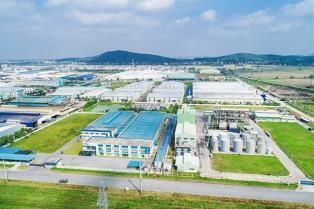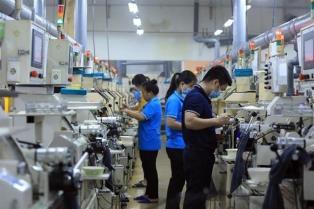Nearly four decades after the launch of the Đổi Mới (Renewal) economic reforms, Việt Nam’s private enterprises have transformed from modest family-run workshops into powerful engines of economic development.

HÀ NỘI — Amid a rapidly changing global economy, Vietnamese entrepreneurs are stepping up as key drivers of the country’s sustained growth and innovation.
As Việt Nam navigates the complexities of a shifting international landscape, its dynamic and forward-thinking private sector is taking centre stage in shaping a resilient and self-reliant national economy.
Nearly four decades after the launch of the Đổi mới (Renewal) economic reforms, Việt Nam’s private enterprises have transformed from modest family-run workshops into powerful engines of economic development.
Today, the private sector contributes approximately 51 per cent of the national GDP, over 30 per cent of State budget revenues, and nearly 60 per cent of total social investment capital - a testament to its vital role in the country's socio-economic advancement.
Economists note that each new factory and every product exported reflects the resilience, entrepreneurial spirit and ambition of Vietnamese business leaders. Beyond contributing to economic value and employment, they are fostering a culture of innovation and accelerating Việt Nam’s integration into the global economy.
To further unlock entrepreneurial potential, the Politburo has introduced a series of strategic policy frameworks - the 'four pillars' - aimed at building an innovation-driven, globally competitive economy:
Resolution 57 positions science, technology, innovation and digital transformation as the new engines of economic growth. Resolution 59 focuses on expanding development space through proactive and comprehensive international integration.
Resolution 66 calls for the completion of a transparent and modern legal framework that safeguards human rights and civil liberties. Meanwhile, Resolution 68 underscores the role of the private sector, aiming to make it the central driving force of the national economy.
These directives have been swiftly institutionalised by the National Assembly and are being actively implemented by the Government, which views effective execution as key to unlocking internal strengths and global potential. Entrepreneurs are expected to lead this transformation.
The national vision to become a developed, high-income country by 2045 is not merely a strategic ambition - it is a direct call to the Vietnamese business community to pioneer new paths in technology, sustainability and global competitiveness.
At the recent Vietnam Private Economic Landscape Programme 2025 (ViPEL 2025) in Hà Nội, Prime Minister Phạm Minh Chính urged private enterprises to align their strategies with national development goals and to lead patriotic movements through innovation, digital transformation and inclusive growth.
Enterprises were encouraged to build holistic capabilities, overcome internal limitations, and become key forces in job creation, productivity, industrialisation, modernisation and economic restructuring. He also emphasised the importance of substantive and effective global integration, enabling Vietnamese firms to rise in global value chains and compete with international peers.
Entrepreneurial innovation across industries

Vietnamese businesses are responding to the Government’s call across multiple sectors.
In aviation, the Airports Corporation of Vietnam (ACV) is spearheading digital transformation through the VNeID application, enabling passengers to authenticate their identities digitally starting December 2025.
This move would eliminate the need for physical documents, streamlining the travel experience and bringing Việt Nam’s aviation infrastructure closer to global standards set by countries like Singapore and South Korea, Phạm Quang Hiếu from ACV told nhandan.vn.
Meanwhile, Vietnam Airlines is accelerating digitisation with services such as online ticketing, digital check-ins and in-flight internet access on long-haul routes to Europe and the US, according to the airline's Deputy General Director Đinh Văn Tuấn.
The airline is also harnessing Big Data and AI to enhance flight safety and operational efficiency by forecasting weather conditions and technical risks.
In the steel sector, Hòa Phát Group has continued its push for innovation with a bold investment of VNĐ14 trillion to construct a high-quality steel production line at the Dung Quất Economic Zone, specialising in rail steel and special-shaped steel.
With a projected annual capacity of 700,000 tonnes, the facility is expected to be operational by 2027 and will play a critical role in national infrastructure development, including the North-South high-speed railway. It also marks a strategic step in reducing Việt Nam’s dependence on imported rail steel.
Trần Đình Long, Chairman of Hòa Phát Group, reaffirmed the company’s commitment to the goals outlined in Resolution 68-NQ/TW, which calls for empowering the private sector as a leading force in the economy.
Speaking to the media, Long urged the Government to promptly address business concerns and adopt a flexible response to the EU's recent decision to double steel import tariffs from 25 per cent to 50 per cent - a move that directly affects domestic producers.
He also called for the prioritisation of Vietnamese-made products in public infrastructure and social housing projects, implemented through transparent procurement and bidding processes.
According to Long, this would not only strengthen domestic industries but also give real effect to the national policy of 'Vietnamese people prioritise using Vietnamese goods'.
As Việt Nam moves toward its long-term development goals, the private sector is not just expected to contribute - it is expected to lead. With supportive policies, a clear vision, and growing ambition, Vietnamese entrepreneurs are poised to become champions of innovation, green growth and global competitiveness. — VNS




